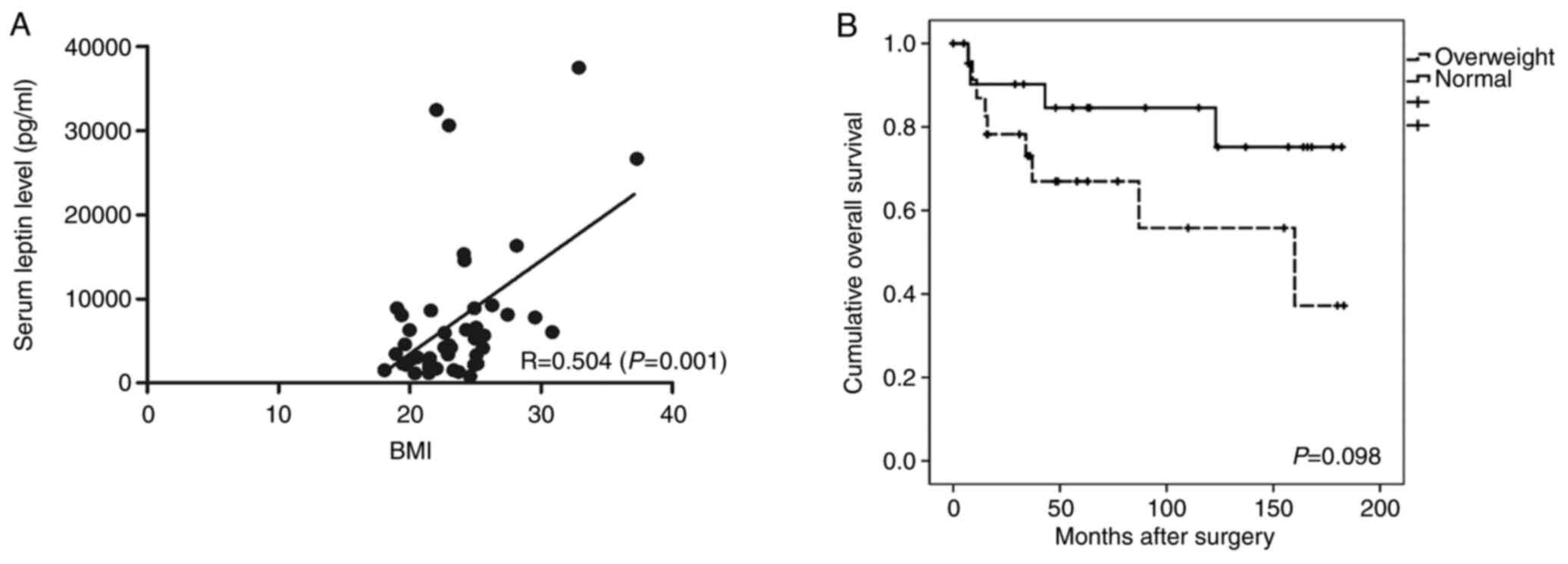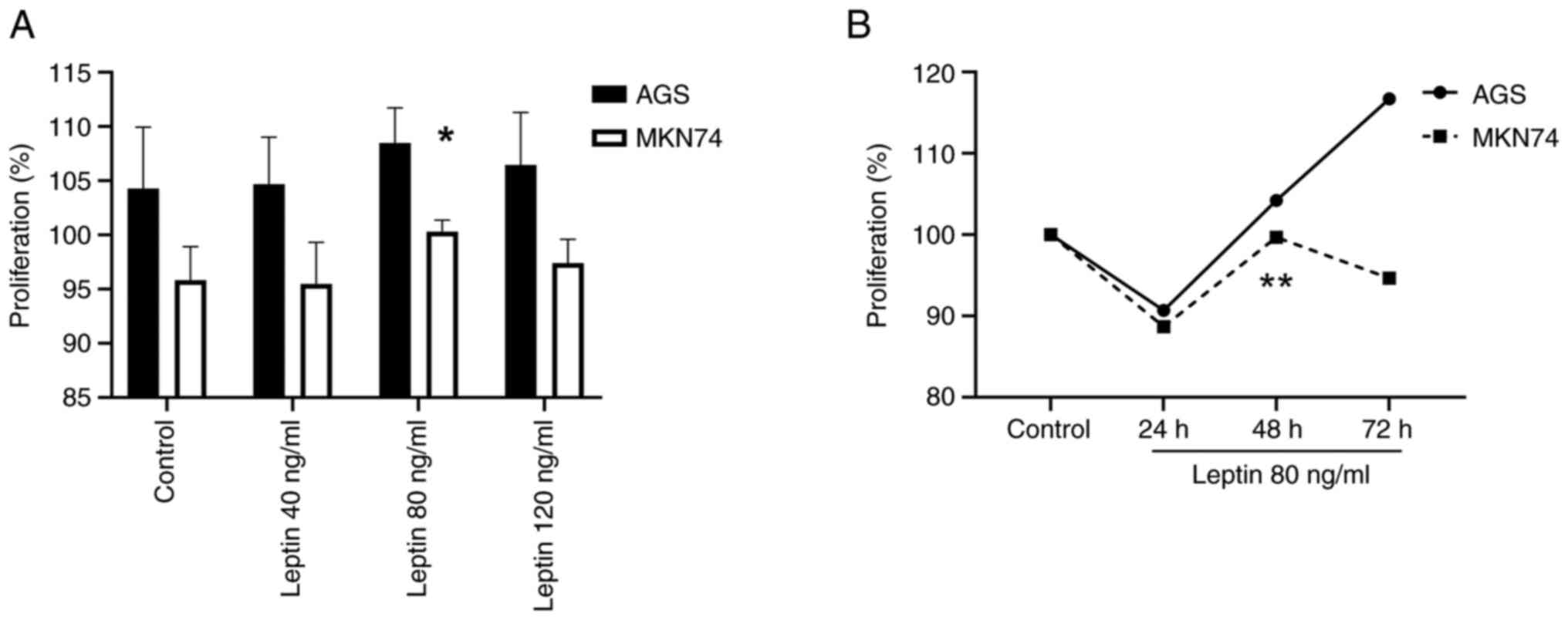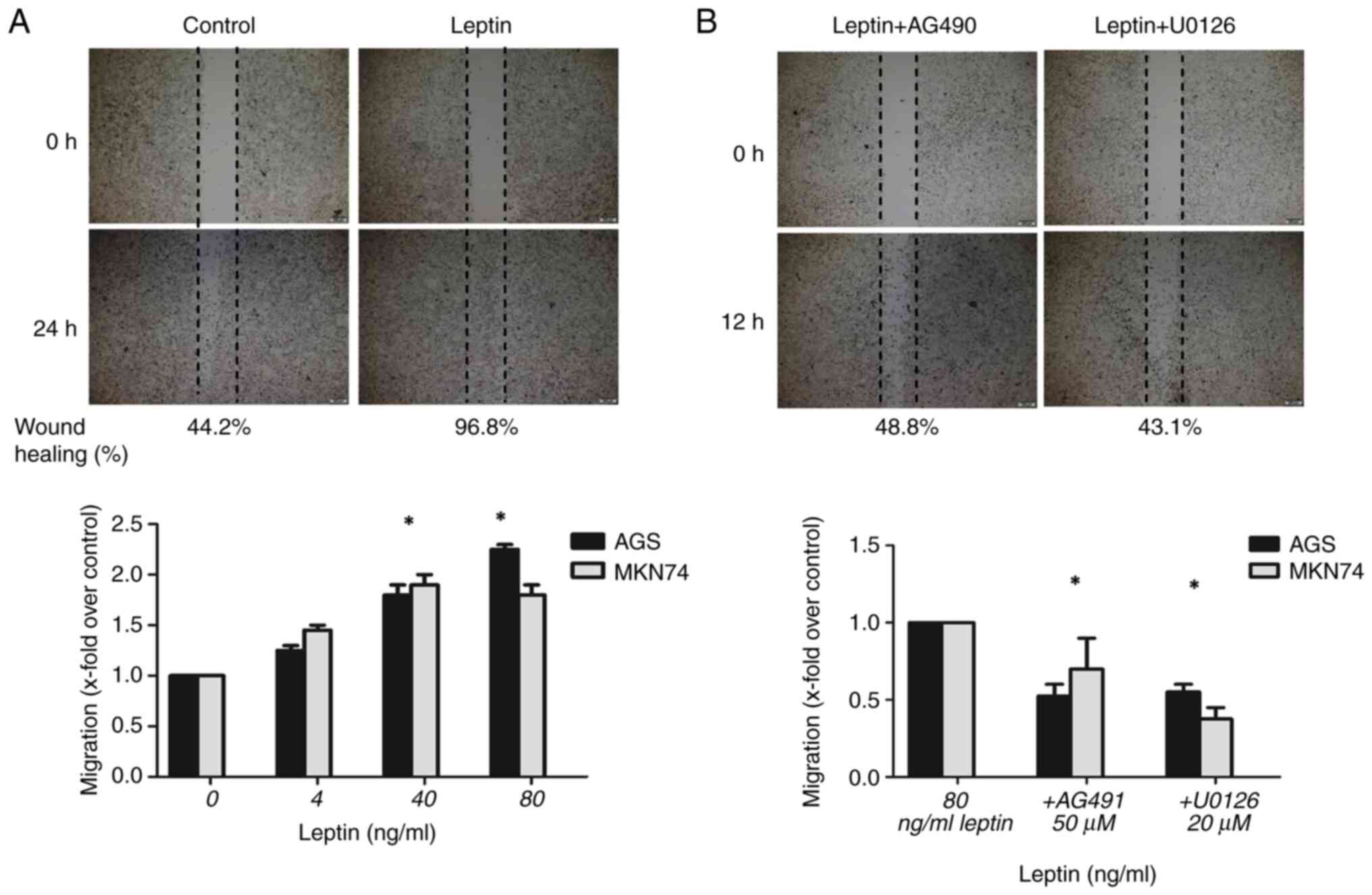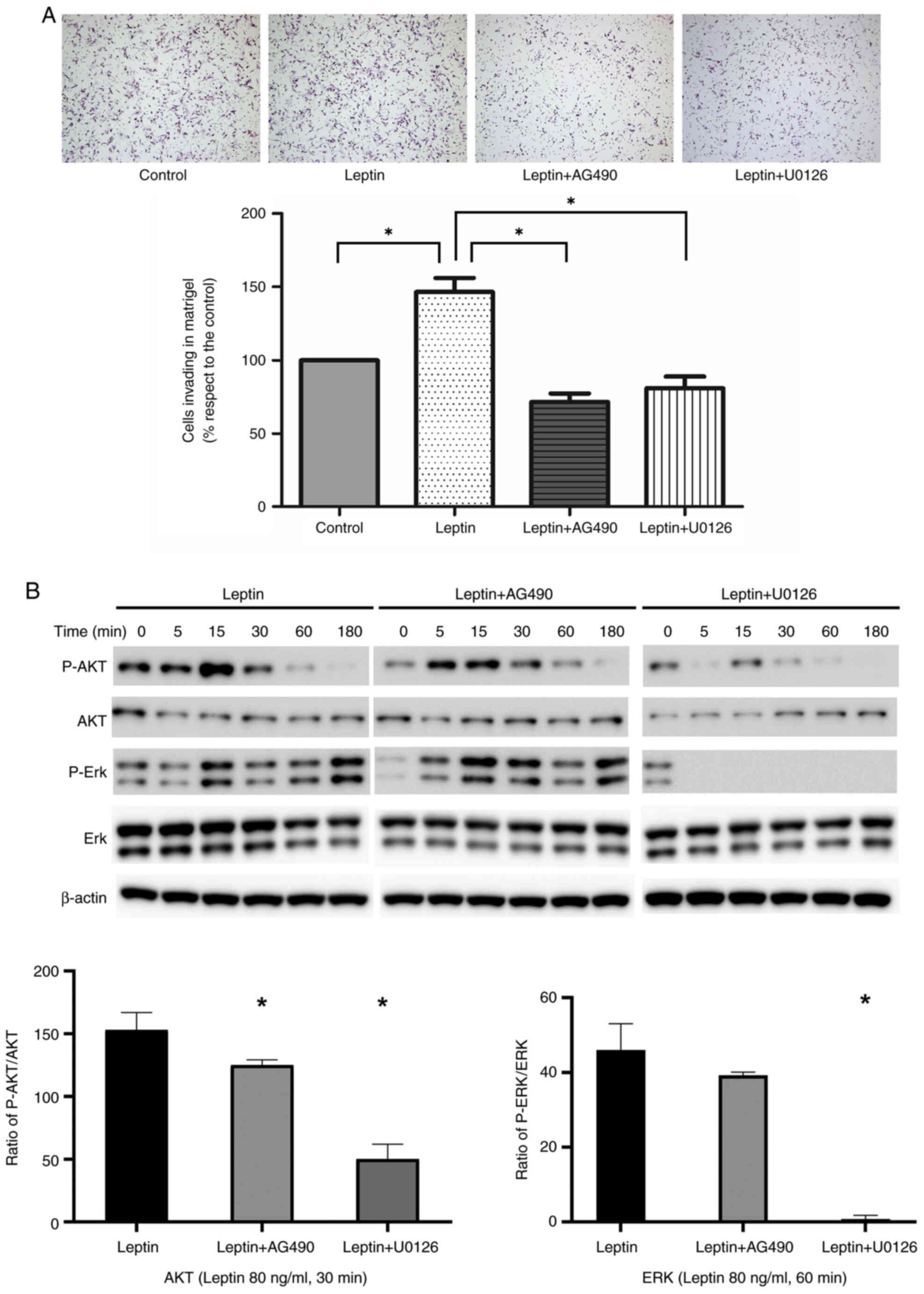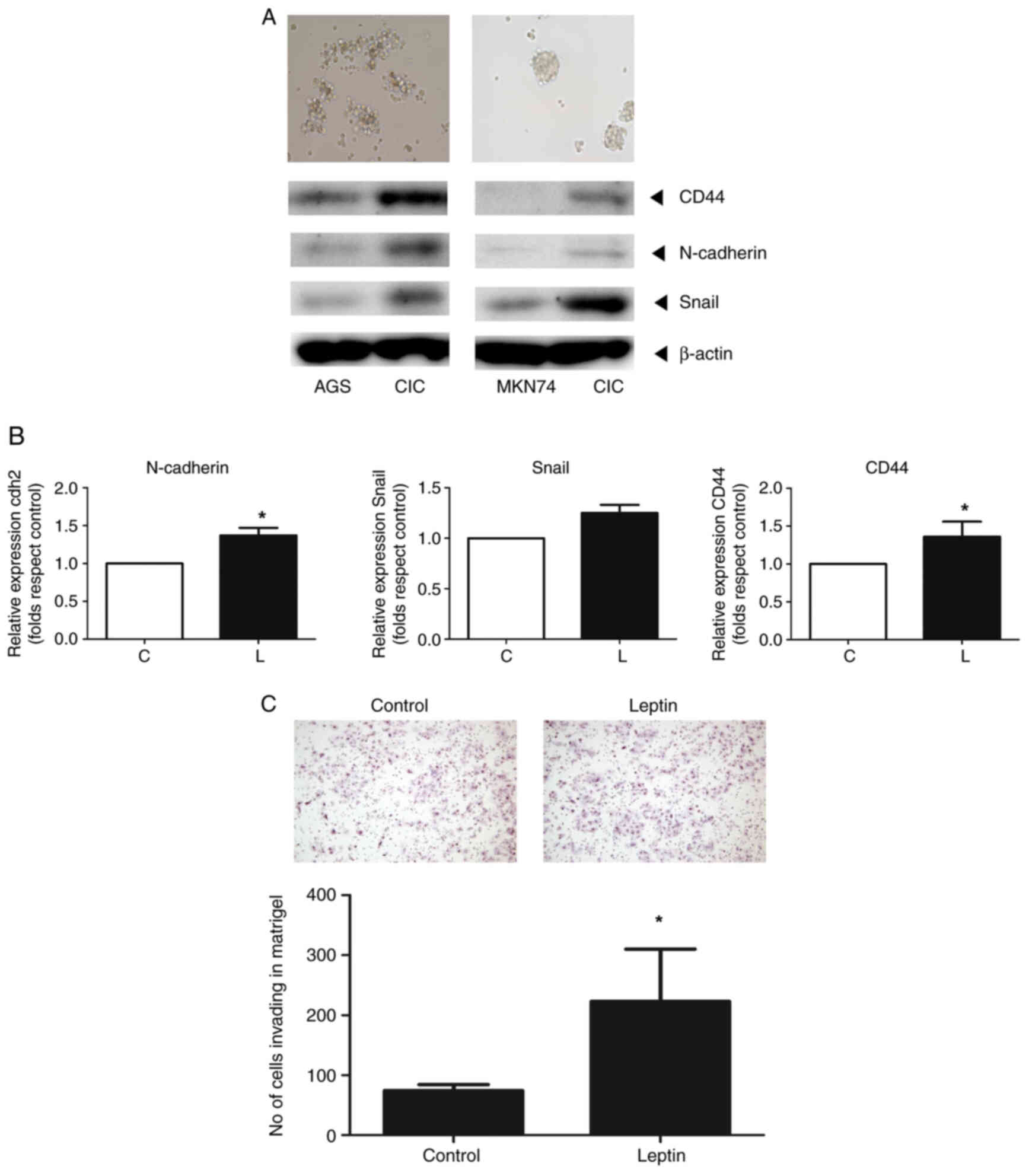|
1
|
NCD Risk Factor Collaboration (NCD-RisC),
. Worldwide trends in body-mass index, underweight, overweight, and
obesity from 1975 to 2016: A pooled analysis of 2416
population-based measurement studies in 128·9 million children,
adolescents, and adults. Lancet. 390:2627–2642. 2017. View Article : Google Scholar
|
|
2
|
Lauby-Secretan B, Scoccianti C, Loomis D,
Grosse Y, Bianchini F and Straif K; International Agency for
Research on Cancer Handbook Working Group, : Body fatness and
cancer-viewpoint of the IARC working group. N Engl J Med.
375:794–798. 2016. View Article : Google Scholar : PubMed/NCBI
|
|
3
|
Guilford P, Hopkins J, Harraway J, McLeod
M, McLeod N, Harawira P, Taite H, Scoular R, Miller A and Reeve AE:
E-cadherin germline mutations in familial gastric cancer. Nature.
392:402–405. 1998. View
Article : Google Scholar : PubMed/NCBI
|
|
4
|
Hirabayashi M, Inoue M, Sawada N, Saito E,
Abe SK, Hidaka A, Iwasaki M, Yamaji T, Shimazu T, Shibuya K, et al:
Effect of body-mass index on the risk of gastric cancer: A
population-based cohort study in A Japanese population. Cancer
Epidemiol. 63:1016222019. View Article : Google Scholar
|
|
5
|
Turati F, Tramacere I, La Vecchia C and
Negri E: A meta-analysis of body mass index and esophageal and
gastric cardia adenocarcinoma. Ann Oncol. 24:609–617. 2013.
View Article : Google Scholar
|
|
6
|
Renehan AG, Zwahlen M and Egger M:
Adiposity and cancer risk: New mechanistic insights from
epidemiology. Nat Rev Cancer. 15:484–498. 2015. View Article : Google Scholar : PubMed/NCBI
|
|
7
|
Rubinstein MM, Brown KA and Iyengar NM:
Targeting obesity-related dysfunction in hormonally driven cancers.
Br J Cancer. 125:495–509. 2021. View Article : Google Scholar : PubMed/NCBI
|
|
8
|
Masuzaki H, Ogawa Y, Sagawa N, Hosoda K,
Matsumoto T, Mise H, Nishimura H, Yoshimasa Y, Tanaka I, Mori T and
Nakao K: Nonadipose tissue production of leptin: Leptin as a novel
placenta-derived hormone in humans. Nat Med. 3:1029–1033. 1997.
View Article : Google Scholar : PubMed/NCBI
|
|
9
|
Bado A, Levasseur S, Attoub S, Kermorgant
S, Laigneau JP, Bortoluzzi MN, Moizo L, Lehy T, Guerre-Millo M, Le
Marchand-Brustel Y and Lewin MJ: The stomach is a source of leptin.
Nature. 394:790–793. 1998. View
Article : Google Scholar : PubMed/NCBI
|
|
10
|
Kolaczynski JW, Considine RV, Ohannesian
J, Marco C, Opentanova I, Nyce MR, Myint M and Caro JF: Responses
of leptin to short-term fasting and refeeding in humans: A link
with ketogenesis but not ketones themselves. Diabetes.
45:1511–1515. 1996. View Article : Google Scholar : PubMed/NCBI
|
|
11
|
Surmacz E: Obesity hormone leptin: A new
target in breast cancer? Breast Cancer Res. 9:3012007. View Article : Google Scholar : PubMed/NCBI
|
|
12
|
Tartaglia LA: The leptin receptor. J Biol
Chem. 272:6093–6096. 1997. View Article : Google Scholar : PubMed/NCBI
|
|
13
|
Saxena NK, Sharma D, Ding X, Lin S, Marra
F, Merlin D and Anania FA: Concomitant activation of the JAK/STAT,
PI3K/AKT, and ERK signaling is involved in leptin-mediated
promotion of invasion and migration of hepatocellular carcinoma
cells. Cancer Res. 67:2497–2507. 2007. View Article : Google Scholar : PubMed/NCBI
|
|
14
|
Carino C, Olawaiye AB, Cherfils S,
Serikawa T, Lynch MP, Rueda BR and Gonzalez RR: Leptin regulation
of proangiogenic molecules in benign and cancerous endometrial
cells. Int J Cancer. 123:2782–2790. 2008. View Article : Google Scholar : PubMed/NCBI
|
|
15
|
Donato J Jr, Frazão R and Elias CF: The
PI3K signaling pathway mediates the biological effects of leptin.
Arq Bras Endocrinol Metabol. 54:591–602. 2010. View Article : Google Scholar
|
|
16
|
Crean-Tate KK and Reizes O: Leptin
regulation of cancer stem cells in breast and gynecologic cancer.
Endocrinology. 159:3069–3080. 2018. View Article : Google Scholar : PubMed/NCBI
|
|
17
|
Cao R, Brakenhielm E, Wahlestedt C,
Thyberg J and Cao Y: Leptin induces vascular permeability and
synergistically stimulates angiogenesis with FGF-2 and VEGF. Proc
Natl Acad Sci USA. 98:6390–6395. 2001. View Article : Google Scholar : PubMed/NCBI
|
|
18
|
Barone I, Catalano S, Gelsomino L, Marsico
S, Giordano C, Panza S, Bonofiglio D, Bossi G, Covington KR, Fuqua
SA and Andò S: Leptin mediates tumor-stromal interactions that
promote the invasive growth of breast cancer cells. Cancer Res.
72:1416–1427. 2012. View Article : Google Scholar : PubMed/NCBI
|
|
19
|
Lee KN, Choi HS, Yang SY, Park HK, Lee YY,
Lee OY, Yoon BC, Hahm JS and Paik SS: The role of leptin in gastric
cancer: Clinicopathologic features and molecular mechanisms.
Biochem Biophys Res Commun. 446:822–829. 2014. View Article : Google Scholar : PubMed/NCBI
|
|
20
|
Tas F, Karabulut S, Erturk K and
Duranyildiz D: Clinical significance of serum leptin level in
patients with gastric cancer. Eur Cytokine Netw. 29:52–58. 2018.
View Article : Google Scholar : PubMed/NCBI
|
|
21
|
Livak KJ and Schmittgen TD: Analysis of
relative gene expression data using real-time quantitative PCR and
the 2(−Delta Delta C(T)) method. Methods. 25:402–408. 2001.
View Article : Google Scholar : PubMed/NCBI
|
|
22
|
Information Committee of the Korean
Gastric Cancer Association, . Korean gastric cancer association-led
nationwide survey on surgically treated gastric cancers in 2019. J
Gastric Cancer. 21:221–235. 2021. View Article : Google Scholar : PubMed/NCBI
|
|
23
|
Mix H, Widjaja A, Jandl O, Cornberg M,
Kaul A, Göke M, Beil W, Kuske M, Brabant G, Manns MP and Wagner S:
Expression of leptin and leptin receptor isoforms in the human
stomach. Gut. 47:481–486. 2000. View Article : Google Scholar
|
|
24
|
Ishikawa M, Kitayama J and Nagawa H:
Expression pattern of leptin and leptin receptor (OB-R) in human
gastric cancer. World J Gastroenterol. 12:5517–5522. 2006.
View Article : Google Scholar
|
|
25
|
Zhao X, Huang K, Zhu Z, Chen S and Hu R:
Correlation between expression of leptin and clinicopathological
features and prognosis in patients with gastric cancer. J
Gastroenterol Hepatol. 22:1317–1321. 2007. View Article : Google Scholar
|
|
26
|
Stattin P, Lukanova A, Biessy C, Söderberg
S, Palmqvist R, Kaaks R, Olsson T and Jellum E: Obesity and colon
cancer: Does leptin provide a link? Int J Cancer. 109:149–152.
2004. View Article : Google Scholar : PubMed/NCBI
|
|
27
|
Garofalo C, Koda M, Cascio S, Sulkowska M,
Kanczuga-Koda L, Golaszewska J, Russo A, Sulkowski S and Surmacz E:
Increased expression of leptin and the leptin receptor as a marker
of breast cancer progression: Possible role of obesity-related
stimuli. Clin Cancer Res. 12:1447–1453. 2006. View Article : Google Scholar : PubMed/NCBI
|
|
28
|
Yoon YS, Kwon AR, Lee YK and Oh SW:
Circulating adipokines and risk of obesity related cancers: A
systematic review and meta-analysis. Obes Res Clin Pract.
13:329–339. 2019. View Article : Google Scholar
|
|
29
|
Thomas T, Burguera B, Melton LJ III,
Atkinson EJ, O'Fallon WM, Riggs BL and Khosla S: Relationship of
serum leptin levels with body composition and sex steroid and
insulin levels in men and women. Metabolism. 49:1278–1284. 2000.
View Article : Google Scholar : PubMed/NCBI
|
|
30
|
Mantzoros CS: The role of leptin in human
obesity and disease: A review of current evidence. Ann Intern Med.
130:671–680. 1999. View Article : Google Scholar : PubMed/NCBI
|
|
31
|
Azuma T, Suto H, Ito Y, Ohtani M, Dojo M,
Kuriyama M and Kato T: Gastric leptin and Helicobacter pylori
infection. Gut. 49:324–329. 2001. View Article : Google Scholar
|
|
32
|
Schneider R, Bornstein SR, Chrousos GP,
Boxberger S, Ehninger G and Breidert M: Leptin mediates a
proliferative response in human gastric mucosa cells with
functional receptor. Horm Metab Res. 33:1–6. 2001. View Article : Google Scholar : PubMed/NCBI
|
|
33
|
Kim JH, Jung H, Jun KH, Kim SK, Chin HM,
Jung JH, Kim W, Jeon HM, Park CH, Park SM, et al: Correlation
between the serum leptin level and the expression of leptin in
stomach cancer patients. J Korean Gastric Cancer Assoc. 8:176–181.
2008. View Article : Google Scholar
|
|
34
|
Seyfried TN and Huysentruyt LC: On the
origin of cancer metastasis. Crit Rev Oncog. 18:43–73. 2013.
View Article : Google Scholar : PubMed/NCBI
|
|
35
|
Lambert AW, Pattabiraman DR and Weinberg
RA: Emerging biological principles of metastasis. Cell.
168:670–691. 2017. View Article : Google Scholar
|
|
36
|
Dong Z, Fu S, Xu X, Yang Y, Du L, Li W,
Kan S, Li Z, Zhang X, Wang L, et al: Leptin-mediated regulation of
ICAM-1 is Rho/ROCK dependent and enhances gastric cancer cell
migration. Br J Cancer. 110:1801–1810. 2014. View Article : Google Scholar : PubMed/NCBI
|
|
37
|
Ji BC, Hsiao YP, Tsai CH, Chang SJ, Hsu
SC, Liu HC, Huang YP, Lien JC and Chung JG: Cantharidin impairs
cell migration and invasion of A375.S2 human melanoma cells by
suppressing MMP-2 and −9 through PI3K/NF-κB signaling pathways.
Anticancer Res. 35:729–738. 2015.PubMed/NCBI
|
|
38
|
Mavrommati I, Cisse O, Falasca M and
Maffucci T: Novel roles for class II Phosphoinositide 3-Kinase C2β
in signalling pathways involved in prostate cancer cell invasion.
Sci Rep. 6:232772016. View Article : Google Scholar : PubMed/NCBI
|
|
39
|
Wong CK, Cheung PF and Lam CW:
Leptin-mediated cytokine release and migration of eosinophils:
Implications for immunopathophysiology of allergic inflammation.
Eur J Immunol. 37:2337–2348. 2007. View Article : Google Scholar
|
|
40
|
Ghasemi A, Saeidi J, Azimi-Nejad M and
Hashemy SI: Leptin-induced signaling pathways in cancer cell
migration and invasion. Cell Oncol (Dordr). 42:243–260. 2019.
View Article : Google Scholar : PubMed/NCBI
|
|
41
|
Mimori K, Fukagawa T, Kosaka Y, Ishikawa
K, Iwatsuki M, Yokobori T, Hirasaki S, Takatsuno Y, Sakashita H,
Ishii H, et al: A large-scale study of MT1-MMP as a marker for
isolated tumor cells in peripheral blood and bone marrow in gastric
cancer cases. Ann Surg Oncol. 15:2934–2942. 2008. View Article : Google Scholar
|
|
42
|
Poincloux R, Lizárraga F and Chavrier P:
Matrix invasion by tumour cells: A focus on MT1-MMP trafficking to
invadopodia. J Cell Sci. 122:3015–3024. 2009. View Article : Google Scholar
|
|
43
|
Dong Z, Xu X, Du L, Yang Y, Cheng H, Zhang
X, Li Z, Wang L, Li J, Liu H, et al: Leptin-mediated regulation of
MT1-MMP localization is KIF1B dependent and enhances gastric cancer
cell invasion. Carcinogenesis. 34:974–983. 2013. View Article : Google Scholar : PubMed/NCBI
|
|
44
|
Jin G, Peng L, Zhang J, Qu L and Shou C:
Cancer and embryo expression protein 65 promotes cancer cell growth
and metastasis. Oncol Lett. 9:1772–1778. 2015. View Article : Google Scholar
|
|
45
|
Petrillo A, Laterza MM, Tirino G, Pompella
L, Pappalardo A, Ventriglia J, Savastano B, Auricchio A, Orditura
M, Ciardiello F, et al: Increased circulating levels of vascular
endothelial growth factor C can predict outcome in resectable
gastric cancer patients. J Gastrointest Oncol. 10:314–323. 2019.
View Article : Google Scholar
|
|
46
|
Onogawa S, Kitadai Y, Amioka T, Kodama M,
Cho S, Kuroda T, Ochiumi T, Kimura S, Kuwai T, Tanaka S and Chayama
K: Expression of vascular endothelial growth factor (VEGF)-C and
VEGF-D in early gastric carcinoma: Correlation with
clinicopathological parameters. Cancer Lett. 226:85–90. 2005.
View Article : Google Scholar
|
|
47
|
Arigami T, Natsugoe S, Uenosono Y,
Yanagita S, Ehi K, Arima H, Mataki Y, Nakajo A, Ishigami S and
Aikou T: Vascular endothelial growth factor-C and -D expression
correlates with lymph node micrometastasis in pN0 early gastric
cancer. J Surg Oncol. 99:148–153. 2009. View Article : Google Scholar
|
|
48
|
Guideline Committee of the Korean Gastric
Cancer Association (KGCA), . Development Working Group & Review
Panel: Korean practice guideline for gastric cancer 2018: An
evidence-based, multi-disciplinary approach. J Gastric Cancer.
19:1–48. 2019. View Article : Google Scholar : PubMed/NCBI
|
|
49
|
Voulgari A and Pintzas A:
Epithelial-mesenchymal transition in cancer metastasis: Mechanisms,
markers and strategies to overcome drug resistance in the clinic.
Biochim Biophys Acta. 1796:75–90. 2009.
|
|
50
|
Kato S, Abarzua-Catalan L, Trigo C,
Delpiano A, Sanhueza C, García K, Ibañez C, Hormazábal K, Diaz D,
Brañes J, et al: Leptin stimulates migration and invasion and
maintains cancer stem-like properties in ovarian cancer cells: An
explanation for poor outcomes in obese women. Oncotarget.
6:21100–21119. 2015. View Article : Google Scholar
|
|
51
|
Tsai JH and Yang J: Epithelial-mesenchymal
plasticity in carcinoma metastasis. Genes Dev. 27:2192–2206. 2013.
View Article : Google Scholar : PubMed/NCBI
|
|
52
|
Frixen UH, Behrens J, Sachs M, Eberle G,
Voss B, Warda A, Löchner D and Birchmeier W: E-cadherin-mediated
cell-cell adhesion prevents invasiveness of human carcinoma cells.
J Cell Biol. 113:173–185. 1991. View Article : Google Scholar
|
|
53
|
Wheelock MJ, Shintani Y, Maeda M, Fukumoto
Y and Johnson KR: Cadherin switching. J Cell Sci. 121:727–735.
2008. View Article : Google Scholar
|
|
54
|
Peña C, García JM, Silva J, García V,
Rodríguez R, Alonso I, Millán I, Salas C, de Herreros AG, Muñoz A
and Bonilla F: E-cadherin and vitamin D receptor regulation by
SNAIL and ZEB1 in colon cancer: Clinicopathological correlations.
Hum Mol Genet. 14:3361–3370. 2005. View Article : Google Scholar
|
|
55
|
Zheng Q, Banaszak L, Fracci S, Basali D,
Dunlap SM, Hursting SD, Rich JN, Hjlemeland AB, Vasanji A, Berger
NA, et al: Leptin receptor maintains cancer stem-like properties in
triple negative breast cancer cells. Endocr Relat Cancer.
20:797–808. 2013. View Article : Google Scholar : PubMed/NCBI
|















